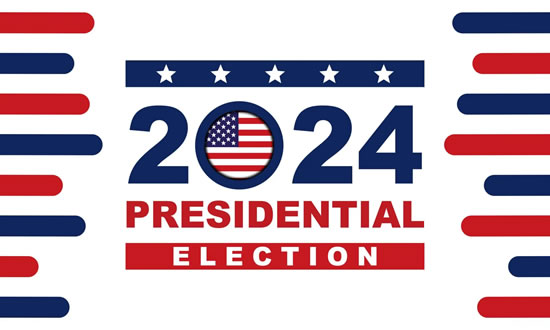There are growing fears about potential unrest in the days following the declaration of the result of the United States highly contentious presidential election.
With rising tensions, accusations of electoral fraud, and increasing polarization leading up to the Election Day, many across the nation have braced for possible post-election turmoil, particularly in the nation’s capital, Washington D.C.
The city has prepared itself for possible unrest in the aftermath of Tuesday’s poll as authorities have taken proactive measures to secure key areas.
Over the weekend, barriers were erected around government buildings, including the Vice President’s residence, and local business owners boarded up storefronts in anticipation.
The Secret Service has installed 8-foot-high metal fences around the White House and the Vice President’s residence at the Naval Observatory.
While officials have emphasized that there are no specific threats of violence at this time, these precautionary steps reflect growing concerns about the potential for post-election disturbances.
ALSO READ: UPDATED: Court terminates treason charges against #EndBadGovernance protesters
The anxiety surrounding post-election unrest is rooted in several key factors, including deep partisan divides, the growing distrust in electoral processes, and the high-stakes nature of this year’s race.
Both the Republican and Democratic parties had increasingly framed the election as a battle for the country’s future, leading to fears that losing candidates may reject the results, further exacerbating divisions.
A significant reason for the heightened anxiety is the widespread suspicion about the election’s integrity.
Former President Donald Trump, who was defeated in the 2020 election, and many of his supporters repeatedly claimed that the election was “stolen.”
These assertions fueled a deep mistrust of the electoral system, particularly among conservative voters, some of whom believe that the 2024 election could be similarly undermined.
On the other side of the political spectrum, his rival, Vice President Kamala Harris’ supporters worry that any contested result could be weaponized to delegitimize the process, sparking protests or even violence.
Activists and civil rights groups had feared that efforts to suppress votes, particularly among minority communities, could provoke widespread protests if the results are disputed.
To mitigate the risk of unrest, Washington D.C. and several key swing states ramped up security measures in anticipation of election night and beyond.
Law enforcement agencies, including the U.S. Capitol Police, are preparing for potential protests, particularly near government buildings like the U.S. Capitol, White House, and federal courts.
The National Guard has been put on standby, ready to assist local police departments should disturbances arise.
Washington D.C. Mayor Muriel Bowser has activated an emergency response plan that includes increased surveillance, crowd control measures, and coordination with federal agencies to ensure public safety.
“We are preparing for a peaceful process, but we are also aware of the potential for unrest,” said Bowser at a recent press briefing.
“The city is equipped and ready to protect its residents and ensure that people can peacefully express their views while maintaining order,” he added.
Additionally, the U.S. Justice Department had announced plans to monitor potential election-related violence or intimidation, with federal prosecutors being tasked to investigate any incidents of voter suppression or election fraud claims.
Special focus will be given to hotly contested areas like Michigan, Georgia, and Pennsylvania, where accusations of irregularities have already surfaced.
Another major concern is the role of misinformation and social media in fueling unrest.
False claims about election fraud were thought to have spread rapidly on platforms like Twitter, Facebook, and alternative media channels, and continued to stoke division and mistrust.
Authorities worry that social media could be used to incite violence or undermine confidence in the results, especially if the election outcome is close.
The Department of Homeland Security (DHS) has warned that extremist groups, both far-right and far-left, could seize on any disputed results to organize protests, block roads, or disrupt government functions.
The FBI has been actively monitoring these groups, coordinating with social media companies to identify and prevent incitement to violence.
“We’re working to ensure that any groups trying to spread false narratives or incite violence are swiftly dealt with,” DHS Secretary Alejandro Mayorkas said recently, adding: “We must ensure the American public can trust in the legitimacy of this election, no matter the outcome.”
Experts say fear of unrest has only been heightened by the level of polarization in U.S. politics, with much of the nation viewing the election as a referendum on the direction of the country.
With each side convinced that the other poses a serious threat to democracy, the idea that the outcome could be peacefully accepted seems increasingly uncertain.
However, the nation is hoping that whoever wins the election that the long-standing tradition of peaceful transitions of power will hold.
NIGERIAN TRIBUNE
